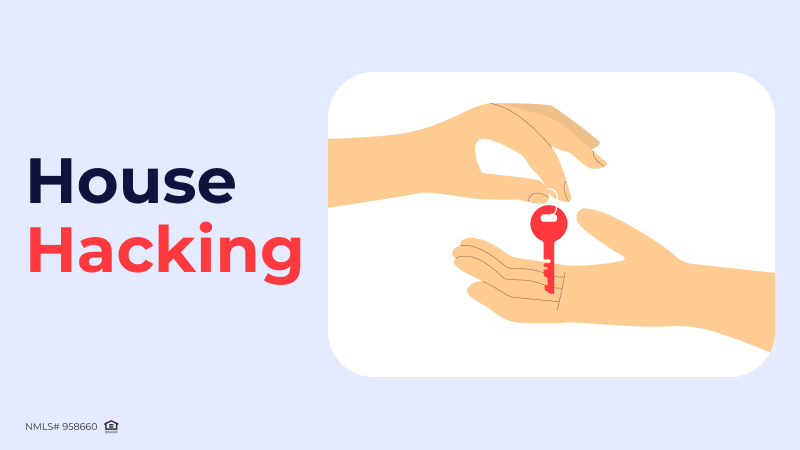
In a volatile real estate market, Millennials face unique challenges in achieving homeownership. As a mortgage broker, you have a pivotal role in guiding this generation towards viable solutions. One such innovative strategy gaining traction is house hacking. This blog aims to provide you, the mortgage broker, with an in-depth understanding of house hacking and practical tips on advising Millennial clients effectively. By the end of this article, you’ll be equipped to help them unlock the door to their first home through this savvy investment strategy.
Looking for a suitable loan program?
Choose among 20+ programs and get
a detailed loan calculation
Understanding House Hacking
What is House Hacking?
House hacking is a creative real estate strategy where an individual purchases a property and rents out portions of it to offset mortgage and other expenses. This approach has evolved from traditional multi-family living concepts to modern applications, leveraging platforms like Airbnb. It’s particularly appealing to Millennials, who find it a realistic method to balance homeownership and financial constraints.
Why House Hacking Appeals to Millennials
The current economic landscape, characterized by high housing costs and student loan burdens, makes traditional routes to homeownership challenging for millennials.
In recent years, this trend has seen a notable increase, especially among younger homebuyers such as Millennials and Gen Z. A survey conducted by Zillow revealed that over half of Millennials (55%) and a similar proportion of Gen Z buyers (51%) consider the ability to rent out part of their property as “very” or “extremely” important. This interest surpasses the overall homebuyer population, where only 39% see this aspect as highly important, indicating a stronger inclination towards house hacking among younger buyers.
Moreover, the overall interest in house hacking has grown from 27% in 2018 to 39% in recent years. This trend also varies by demographics, with 51% of Latino homebuyers expressing a higher interest in using part of their property for rental income, compared to 46% of Black respondents and 40% of white respondents¹. These statistics underscore the growing appeal of house hacking as a strategic response to the financial challenges of homeownership, particularly among younger generations seeking innovative ways to enter the housing market.
Financial Benefits of House Hacking
House hacking can be a game-changer financially. It offers a pathway to reduce or even eliminate housing costs, build equity, and possibly gain profit from property appreciation. For instance, owning a duplex and renting out one half can potentially cover the entire mortgage, leading to direct financial benefits like equity buildup and indirect benefits like saving on rent. Over time, this strategy can lead to substantial financial gains and even set the foundation for future real estate investments.
How Mortgage Brokers Can Guide Millennials
- Identifying Suitable Properties:
Your first role is to help clients find properties that are ideal for house hacking. Look for multi-family units, homes with accessory dwelling units (ADUs), or properties that can easily be partitioned for renters. - Financial Planning and Analysis:
Assist in analyzing the costs versus potential rental income. This involves understanding mortgage payments, insurance costs, property taxes, and upkeep expenses. A thorough financial analysis will help determine the feasibility and profitability of house hacking ventures. - Local Market Insights:
Provide insights into local real estate trends, rental markets, and property values. Millennials benefit greatly from understanding the dynamics of the area they are investing in, including potential rental income and property appreciation rates. - Legal and Zoning Knowledge:
Navigate the complexities of zoning laws, HOA rules, and landlord-tenant regulations. As a broker, your knowledge in these areas is crucial in guiding clients through legal hurdles and ensuring compliance. - Financing Solutions:
Guide them through various mortgage options, considering how rental income affects loan qualifications. Discuss different loan types, down payment requirements, and the impact of potential rental income on their mortgage application. - Risk Management and Preparedness:
Discuss the potential risks involved, including tenant issues, maintenance responsibilities, and vacancy risks. Preparing clients for the realities of being a landlord is essential for successful house hacking.
The Role of Technology in House Hacking
Leverage technology to enhance your service offering. Utilize online tools for property searches, financial calculators for mortgage and rental income estimations, and apps for property management. Encourage clients to use platforms like Airbnb for short-term rentals or property management software for ease in handling long-term tenants.
Building Long-term Client Relationships
Advising clients on house hacking can foster long-term relationships. By guiding Millennials through their first home purchase and investment strategy, you position yourself as a trusted advisor for future real estate endeavors. This can lead to repeat business and referrals, expanding your client base.
Struggling with a loan scenario?
Get a solution in 30 minutes!Fill out the short form and get your personal offer
Submit a ScenarioConclusion
House hacking offers a practical and lucrative path to homeownership for Millennials. As a mortgage broker, your expertise in this area is invaluable. By guiding clients through property selection, financial planning, legalities, and risk management, you empower them to make informed decisions and achieve their homeownership dreams. Embrace this opportunity to assist the next generation in navigating the real estate market through house hacking, and in doing so, cement your role as an indispensable resource in their financial journey.


